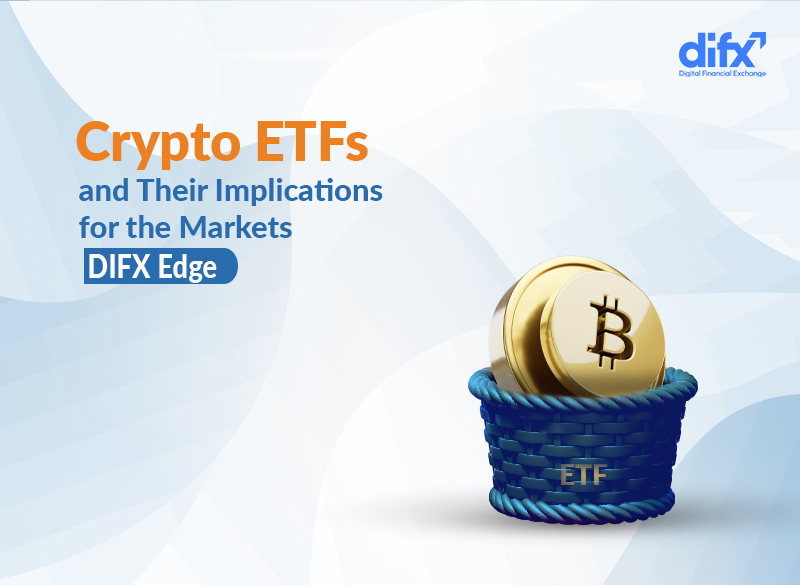Every now and then, crypto ETFs make headlines in one way or another; it may be a new Bitcoin or web3-focused ETF entering the markets or the US regulators rejecting yet another Bitcoin ETF.
Just today, Financial Times published a piece on how growing crypto adoption in Asia is pushing many funds and asset managers to establish new routes for investors to provide them with direct and indirect exposure to the crypto and blockchain markets.
But this move is not just limited to countries like Singapore, Hong Kong, and Korea. Just recently, Bitwise, a well-known San Francisco-based crypto fund launched its web3 ETF, “set to capture one of the biggest growth opportunities in tech”.
But, what are ETFs really, and how important they are for the crypto and blockchain markets? And can they really have a hand in the mass adoption of the industry?
What is an Exchange-Traded Fund (ETF)?
An Exchange-Traded Fund or ETF is a group of stocks, commodities, indices, or other financial assets brought together by a fund. The fund then offers the shares of its ETF on a stock exchange, presenting a more convenient way for traders and investors to get exposure to different assets at once.
The funds can offer ETFs that track the price of any financial instrument; from a single commodity to a diversified group of stocks. Toronto 35 Index Participation Units (TIPs) was the world’s first ETF which was launched in 1990 on Toronto Stock Exchange.
Bitcoin and Crypto ETFs
As we mentioned before, the fund would set up an ETF by buying and holding the assets included. The same rule applies to Bitcoin and other crypto-related ETFs. For a Bitcoin ETF, for instance, the fund buys Bitcoin and offers the shares of its ETF on an exchange to be traded by interested investors.
Just like traditional ETFs, Canada took the first step for Bitcoin ETFs as well, as the rest of the world was still contemplating their next move. The Purpose Bitcoin ETF (BTCC) was the first Bitcoin ETF in the world that was listed on Toronto Stock Exchange on February 18, 2021.
Crypto ETFs, however, are not limited to Bitcoin. As blockchain technology, the backbone of Bitcoin and many other crypto projects started to gain attraction for its unique and practical features, various companies in different sectors started to apply the technology to streamline their work. IBM, Oracle, and Intel are just some of the prominent names that have embraced this technology.
With the growing popularity of blockchain in different industries, some funds started offering Blockchain ETFs which combine the shares of the companies utilizing the technology. By the same structure, a Web3 ETF would give the investors or traders the opportunity to get exposure to companies that are well positioned in the web3 space.
The Dramatic Relationship of the US SEC and Bitcoin ETFs
Investors and traders are always eager to see the US regulators’ approach toward novel financial assets and products as it’s the world’s largest economy. Additionally, other jurisdictions also follow the country’s move to either follow suit or take advantage of its slow response and position themselves as a promising destination for eager market members.
The twisted affairs between the US Security and Exchange Commission (SEC) and Bitcoin ETFs started back in 2013 by Winklevoss Brothers. The SEC rejected their request for a Bitcoin ETF in 2017, reasoning that:
“Based on the record before it, the Commission believes that the significant markets for bitcoin are unregulated… the Commission does not find the proposed rule change to be consistent with the Exchange Act.”
Funds and asset managers in the US should register their ETFs first with the SEC to be able to offer them to the public. All further attempts for a Bitcoin ETF were rejected by the SEC until October 2021 when the first Bitcoin-linked ETF was approved in the US. But even now, ProShares Bitcoin Strategy ETF (BITO) focuses on Bitcoin futures contracts and does not directly invest in the Bitcoin market.
What It Means for the Crypto Market
Bitcoin and Crypto ETFs allow investors to get exposure to Bitcoin’s relatively high returns without the hassle of owning and managing the coins themselves. This is especially important for crypto assets as they are not the easiest financial instrument to hold and keep secure, a barrier holding many retail investors and businesses back. Aside from this, a crypto ETF can be more assuring for some as they can be traded on a regulated stock exchange.
A crypto ETF would open the doors for many stock traders and investors who don’t feel comfortable getting in touch with crypto assets directly, improving adoption and eventually leading to a more mature, and hopefully regulated, crypto market.

